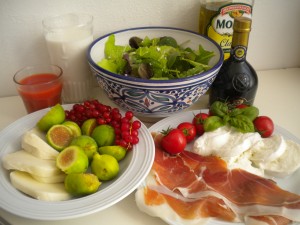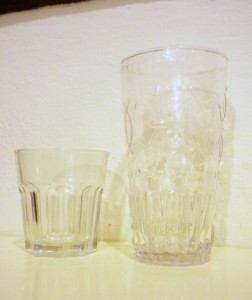A Simple Breakfast

I didn’t have time to go to a restaurant for lunch, or to make it to the good market, so I had to make do with what I could grab from the little corner store at the end of my block. Still, not too shabby.
Good Mozzarella di Bufala, tomatoes, basil, a sweet Prosciutto Toscano, young first crop figs, redcurrants, young Pienza (the official cheese of Pope Pius II), a tall glass of milk, fresh blood orange juice, and salad with Greek feta and Italian oil and vinegar. (As you read I’ll give you three guesses and a few paragraphs to figure out which of these things was the hardest to find).
While everyone expects to be wowed by the restaurants in Italy, the grocery stores are just as overwhelming, and many of my most memorable Italian meals have been at home. Grab a few fresh veggies and fry them in olive oil, serve over pasta. But even cooking things is often unnecessary. Italian cuisine is about ingredients: good vegetables, good cheese, good meat that you can just eat, no need for preparation, eat. In Venice, where all but a golden handful of restaurants are tourist traps, I usually just go into a grocery store and buy a quarter kilo of whatever cheese is freshest and sit by the canal and eat it (and offer it to any sad-looking anglophone strangers who wander by, and are inevitably delighted). The cold cuts too are a centerpiece instead of a substitute for real food. Most countries never have and never will consider cold cuts a main dish, but if you get really good ones they don’t need to be disguised with a sandwich and its toppings, they are, by themselves, perfect. Real prosciutto literally melts on your tongue like butter and fills your mouth with the soft sweet salt of paper thin meat – more flavor from one ounce than from an entire pack of common store “salami”.
It’s actually slightly unsettling how much better the ingredients are. Figs and oil one expects to be better here since here is where they come from, and redcurrants and Pienza cheese (a soft, chewy cheese with the texture of colby or jack, but with a mild Romano-esque tinge, gentle and filling; completely different in its aged state which is so strong down the Romano spectrum as to be almost spicy) you can’t find in most corner stores, but it’s the simpler things that are slightly alarming. Milk, for example.
Keep in mind here that I’m a serious milk drinker. I don’t just like milk, I actually systematically explore milk, comparing different brands, farms, percent mixes. I’m not a 1% person or a skim person or a whole milk person, since I like all of them, each for its unique qualities, the creamy instant-full-feeling of whole. I can therefore say with some confidence that milk here is better. It just flat out tastes better than milk in America. The common, cheapest of the cheap store brand milk tastes as good as the fancy expensive organic stuff in the US. In fact it tastes as good as the extremely expensive un-homogenized stuff, except for not having the lumps of half-formed butter peppering it as it glides down. Why? The only answer I can come to is production without hormones. I’m not saying this out of any environmentalist agenda, just as a neutral observation from someone who’s tasted a lot of milk. Italian tomatoes being superior is one thing–they get better sun here, better soil, the tickle of the Mediterranean in the air–but cows are not photosynthetic. EU restrictions on artificial hormones is the only real difference I can think of.
That and the fact that Italians care about ingredients. In fact, the whole cuisine is about ingredients.
No one can win an argument about which is the best cuisine in the world, and I won’t argue that even the finest (non-truffle) pasta dish is usually not a match for a proper French or Turkish pastry or a really good tuna nigiri, but I think I’m right in saying that Italian is the best simple cuisine in the world. The most delicious pasta sauces are usually still just a few ingredients prepared in a very simple way. My Amatriciana and Carbonara I can make in the time between when the pasta goes in the water and when it’s soft enough to eat. Because so little is done to the ingredients, their quality really shows through. This is likely why it developed in Italy, where the vegetables and other food are naturally so good, so doing almost nothing to them is best. Elaborate kitchen alchemy is necessary only when the fundamental foods are, well, the sorts of things subsistence cultures had to eat. French baking is an art form, as are German sausages, all kinds of curry, but when what you have are truly good ingredients, Italian is definitely the best way to bring them out. That also makes it the easiest great cuisine to become proficient in. Anyone who wants to achieve a fine French sauce, or even cook a really, really good steak, requires a decent apprenticeship. Good Italian? One session in the kitchen with me and you can wow friends and neighbors, and I didn’t have much more than that with the Italian Moms (and American professors) who taught me.
Have you had your three guesses yet? That’s right! The most difficult thing to find was: a tall glass of milk. Specifically a tall glass, as for reasons passing my understanding the standard sized drinking glass in Italy holds about three mouthfuls of liquid if that. I had a grand hunt up and down the shopping district hunting for a glass large enough for what I never realized was apparently a rare perversion: taking a deep breath and downing a huge, cool glass of water, or taking a large volume of something with you to accent a meal. Between that and the fact that water is so scarce and expensive in restaurants, and wine so common, I remain among those baffled that the Italians don’t all die of dehydration. In Rome where public fountains provide free water everywhere it’s one thing, but in Florence where said fountains are scarce and, when present, inevitably broken? Must be the patron saints. Or… who would be the Roman god of hydration. Neptune, maybe? Apollo? Castor and Pollux perhaps? Leucothea?
2 Responses to “A Simple Breakfast”
-
Ironically what this makes me think is
A) go to Italy and eat much deliciousness
B) Italian recipes aren’t that useful outside Italy. -
For the record, I have always found your ability to inhale almost a pint of liquid at a go slightly disturbing ^^;; Based on your observation about the average size of glasses in Italy, I now wonder if that’s a product of my having grown up overseas.



